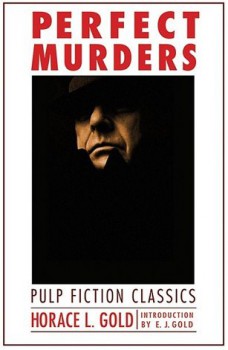Jackson Kuhl Reviews Perfect Murders
 Perfect Murders
Perfect Murders
Horace L. Gold
Bison Books (360 pp, $19.95, May 2010)
Reviewed by Jackson Kuhl
Raymond Chandler once noted how bad directors filmed whole sequences of mundane actions that could be more simply communicated in a single shot. A man need not be shown climbing into a cab and going to the post office to receive a letter, for example – all the audience needed was an anonymous postman handing the man the letter. This kind of boring direction, Chandler believed, was a holdover from the time when film was new and watching everyday occurrences on celluloid was still thrilling.
And so it is with Horace Gold. He was, in turn, a World War II veteran, the highest paid comic-book writer in the world, and the editor of Galaxy Science Fiction for over a decade. He was also an accomplished pulp fictioneer. Perfect Murders: Pulp Fiction Classics collects six of Gold’s science-fiction detective mash-ups; a seventh, “I Know Suicide,” is a straight noir mystery. Unfortunately, most of these stories are artifacts of their time, thin plots so laden with long passages of dialogue and commonplace action that the eyes glaze and the mind drowses.
Most tedious is the novella “A Matter of Form,” in which a mad surgeon switches the brains of an unemployed Joe and a Border collie, and the Joe’s imprisoned consciousness must convince a reporter and his editor that he is man, not beast, so that his true form might be regained. This slow, tortuous persuasion is like watching glue dry. According to the introduction by Gold’s son E.J., the two later adapted the story into a teleplay, which they submitted first to the original Star Trek. Gene Roddenberry rejected the script with the note that neither Shatner nor Nimoy would step off-stage for a Lassie actor. The Golds then submitted the script to other shows, but the series were always canceled before they could make headway. This ludicrous yet sad saga of the washed-up elder, his son, and their awful script reads like one of Fitzgerald’s Pat Hobby stories, making the introduction more entertaining than the actual novella. If only they had dramatized those events instead.
Gold has a few shining moments, such as when he lays down a great hardboiled line like, “Of all of mankind’s scientific gadgets, the telephone booth most clearly demonstrates that this is a world of five feet nine.” The story “Love in the Dark” is easily the best in the collection, a prompt and clever tale wherein a dissatisfied housewife is seduced by an extraterrestrial incubus.
Yet the bulk of Perfect Murders is antiquated convention, rising out of an era when writers made their money rounding out stories to increase word count. Pages of expositional dialogue could be reduced to brief passages of back-story; fisticuffs and cliffhanging would make better punctuation than taxi rides uptown. The joke here is that Gold the writer could have really used a better editor.
___________
This review originally appeared in Black Gate Magazine #15
Jackson Kuhl is a journalist and author of Samuel Smedley, Connecticut Privateer,now available for Nook and Kindle. His website is www.jacksonkuhl.com.
Mr. Kuhl is far too kind in his assessment of this travesty. E. J. butchered his father’s stories in numerous ways, which I won’t go into here. I received a review copy several years ago for review at SF Site, but after throwing the book literally across the room, wrote Rodger Turner and told him what he could expect from my review. He told me to forget it, and so I did. If E.J. would have kept his mitts off the stories (and not included the aforementioned unsold novella) I might have recommended the book, but as is, you should definitely pass on this one if ever you thought of buying it.